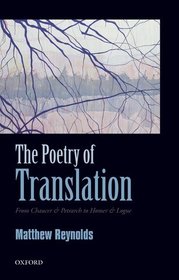
The Poetry of Translation
From Chaucer & Petrarch to Homer & Logue
-
10% KEDVEZMÉNY?
- A kedvezmény csak az 'Értesítés a kedvenc témákról' hírlevelünk címzettjeinek rendeléseire érvényes.
- Kiadói listaár GBP 46.49
-
22 210 Ft (21 152 Ft + 5% áfa)
Az ár azért becsült, mert a rendelés pillanatában nem lehet pontosan tudni, hogy a beérkezéskor milyen lesz a forint árfolyama az adott termék eredeti devizájához képest. Ha a forint romlana, kissé többet, ha javulna, kissé kevesebbet kell majd fizetnie.
- Kedvezmény(ek) 10% (cc. 2 221 Ft off)
- Kedvezményes ár 19 989 Ft (19 037 Ft + 5% áfa)
Iratkozzon fel most és részesüljön kedvezőbb árainkból!
Feliratkozom
22 210 Ft

Beszerezhetőség
Megrendelésre a kiadó utánnyomja a könyvet. Rendelhető, de a szokásosnál kicsit lassabban érkezik meg.
Why don't you give exact delivery time?
A beszerzés időigényét az eddigi tapasztalatokra alapozva adjuk meg. Azért becsült, mert a terméket külföldről hozzuk be, így a kiadó kiszolgálásának pillanatnyi gyorsaságától is függ. A megadottnál gyorsabb és lassabb szállítás is elképzelhető, de mindent megteszünk, hogy Ön a lehető leghamarabb jusson hozzá a termékhez.
A termék adatai:
- Kiadó OUP Oxford
- Megjelenés dátuma 2014. április 3.
- ISBN 9780199687930
- Kötéstípus Puhakötés
- Terjedelem386 oldal
- Méret 217x142x21 mm
- Súly 462 g
- Nyelv angol 0
Kategóriák
Rövid leírás:
A wide-ranging book which launches a new theory of poetry translation and pursues it through readings of poem-translations from across the history of English literature. It engages with the key debates in translation studies, and offers new interpretations of major works such as Pope's Iliad, Pound's Cathay, and Dryden's Aeneis.
TöbbHosszú leírás:
Poetry is supposed to be untranslatable. But many poems in English are also translations: Pope's Iliad, Pound's Cathay, and Dryden's Aeneis are only the most obvious examples. The Poetry of Translation explodes this paradox, launching a new theoretical approach to translation, and developing it through readings of English poem-translations, both major and neglected, from Chaucer and Petrarch to Homer and Logue.
The word 'translation' includes within itself a picture: of something being carried across. This image gives a misleading idea of goes on in any translation; and poets have been quick to dislodge it with other metaphors. Poetry translation can be a process of opening; of pursuing desire, or succumbing to passion; of taking a view, or zooming in; of dying, metamorphosing, or bringing to life. These are the dominant metaphors that have jostled the idea of 'carrying across' in the history of poetry translation into English; and they form the spine of Reynolds's discussion.
Where do these metaphors originate? Wide-ranging literary historical trends play their part; but a more important factor is what goes on in the poem that is being translated. Dryden thinks of himself as 'opening' Virgil's Aeneid because he thinks Virgil's Aeneid opens fate into world history; Pound tries to being Propertius to life because death and rebirth are central to Propertius's poems. In this way, translation can continue the creativity of its originals.
The Poetry of Translation puts the translation of poetry back at the heart of English literature, allowing the many great poem-translations to be read anew.
Review from previous edition: Wide-ranging and very readable ... He writes clearly, and the opening chapters offer friendly and careful negotiations of a fairly complex range of theoretical positions, accessibly introduced ... Reynolds does much to elucidate the relationship between the received wisdom about a text and the metaphors for translation that are applied to it.
Tartalomjegyzék:
I. Translation and Metaphor
The Scope of Translation
Translating Within and Between Languages
Translation and Paraphrase
Translating the Language of Literature
Words for Translation
Metaphors for Translation
The Roots of Translatorly Metaphors
II. Translation as 'Interpretation,' as 'Paraphrase,' and as 'Opening'
Are translations interpretations? Gadamer, Lowell and some contemporary poem-translations
Interpretation and 'Opening:' Dryden, Chapman, and early translations from the Bible
'Paraphrase' from Erasmus to 'Venus T----d'
Dryden, Behn and what is 'secretly in the poet'
Dryden's Aeneis: 'a thousand secret beauties'
Dryden's Dido: 'somewhat I find within'
III. Translation as 'Friendship,' as 'Desire,' and as 'Passion'
Translating an Author: Denham, Katherine Philips, Dryden, Cowper
The Author as Intimate: Roscommon, Philips, Pope, Francklin, Lucretius, Dryden, FitzGerald, Untermeyer
Erotic Translation: Theocritus, Dryden, Ovid, Richard Duke, Tasso, Fairfax, Petrarch, Charlotte Smith, Sappho, Swinburne
Love again: Sappho, Addison, Ambrose Philips, Dryden, Petrarch, Chaucer, Wyatt, Tasso, Fairfax, Ariosto, Harington, Byron
Byron's Adulterous Fidelity
Pope's Iliad: The Hurry of Passion
IV. Translation and the Landscape of the Past
Pope's Iliad: a 'comprehensive View'
Some perspectives after Pope: Keats, Tennyson, Browning, Pound, Michael Longley
Epic Zoom: Christopher Logue's Homer (with Anne Carson's Stesichorus and Seamus Heaney's Beowulf)
V. Translation as 'Loss,' as 'Death,' as 'Resurrection,' and as 'Metamorphosis'
Ezra Pound: 'My job was to bring a dead man to life'
FitzGerald's Rubáiyát: 'a Thing must live'
The Metamorphoses of Arthur Golding (which lead to some Conclusions)




